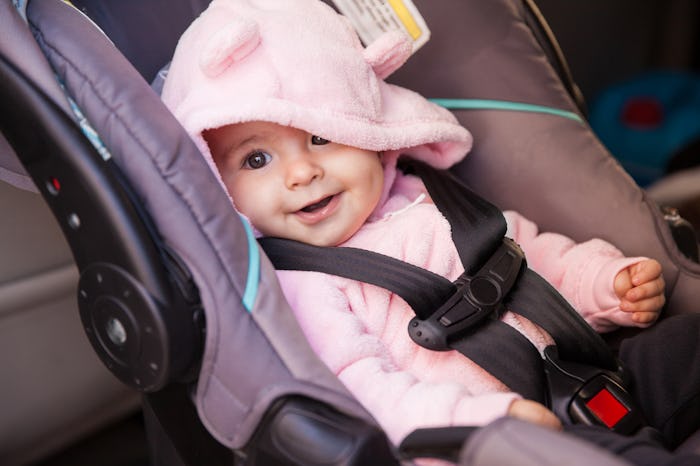Life

Turns Out, Babies Can Get Car Sick
Knowing what exactly goes on in your baby's brain is impossible, but it's easy to wonder if they experience the same sensations adults do. If you or your partner struggle with motion sickness during road trips, plane rides, boat rides, or even, you know, just walking down the street, you might be wondering if babies get car sick just like adults do. No parent wants their child to get sick every time they're in the car, but understanding if, how, and why it might happen to your child can help you prevent, and hopefully treat, it in the future.
According to the Mayo Clinic, motion sickness can technically happen at any age, although it's most common in kids aged 2 to 12. They noted that car sickness occurs when the brain receives conflicting information from the inner ear, eyes, and nerves, causing internal confusion, in a sense.
It's not clear why some children are affected more than others, but it makes sense that when a baby sits rear facing, low down in a car seat, they may get disoriented from the bumping, turning, and moving during a car ride. Baby Center noted that the most common symptoms of motion sickness in babies and children is nausea, lack of appetite, cold sweat, and (in extreme cases) vomiting.
Although the thought of your baby being nauseated by something as common as riding in the car, there are a few ways you can either minimize the severity of their symptoms or prevent them altogether.
Dr. Sears' website suggested that since parents can't turn their rear-facing baby around, they offer them something to soothe their upset stomach, like crackers or a bottle. Similarly, try to make the drive as smooth as possible by avoiding bumps and sudden turns, and stops. The sooner you can spot the symptoms the better, because they usually get progressively worse if not handled sooner rather than later. For older children, encourage them to look out the window and let them get fresh air as often as possible.
The good news is that carsickness goes away on it's own — usually within 15 minutes of stopping the car or easing the symptoms — and may get better with age. If you think your baby might struggle with motion sickness, these simple steps can help to relieve it, making car rides easier for everyone involved.